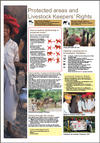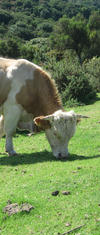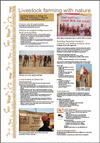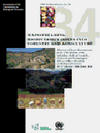Livestock farming with nature
“Pastoralists and small-scale livestock keepers are crucial to conserving farm animal genetic resources”, says this poster, presented by LPP at the 13th meeting of the Subsidiary Body on Scientific, Technical and Technological Advice of the Convention on Biological Diversity, 18-22 Feb 2008 in Rome.
The accompanying abstract, published in the CBD Technical Series 34, outlines the LIFE approach to documenting indigenous breeds, lobbying and advocacy for Livestock Keepers’ Rights, and exploring value addition and marketing for livestock products.
Download poster PDF, 473 kb
Download abstract PDF, 371 kb
Protected areas and Livestock Keepers’ Rights

“How to destroy biodiversity in protected areas?” asks this poster.
“Easy! Just ban traditional grazing there.”
Banning pastoralists from traditional grazing areas alters the balance of wildlife, making scarce species such as leopards, lions and bustards even scarcer.
This poster by LPP’s Ilse Koehler-Rollefson and Hanwant Singh Rathore of Indian partner Lokhit Palu-Pashak Sansthan, outlines how pastoralists are fighting such bans. It was prepared for the Working Group on Protected Areas on 11-15 February 2008 in Rome.
Download poster 722 kb
Pastoralism and biodiversity

Pastoralists and support organizations attending an international meeting on biodiversity have issued a statement demanding recognition for the role of pastoralists in conserving biodiversity.
The ninth meeting of the Conference of Parties of the Convention on Biological Diversity is taking place in Bonn, Germany, from 19 to 30 May 2008.
“When land is taken away for crop cultivation or for ‘Protected Areas’, pastoralists are denied access to traditional grazing lands and pastures. There is no so-called ‘wasteland’. Land that is considered ‘waste’ by the state is used by pastoralists for grazing their animals and managing herds”, says the statement.
“We demand that the contribution of pastoralists to the conservation and sustainable use of biodiversity is recognised and rewarded… Pastoralists do not want food aid but the capacity to produce and market their speciality products.”
Download full statement (1 page, 42 kb)
- Go to the previous page
- 1
- …
- 49
- 50
- 51
- 52
- 53
- 54
- 55
- …
- 76
- Go to the next page


